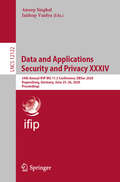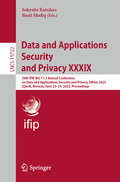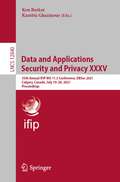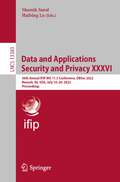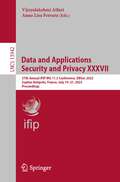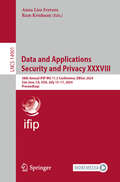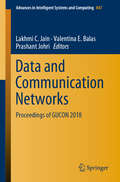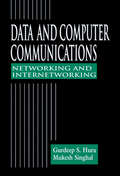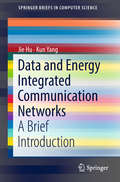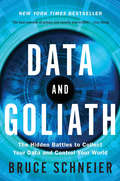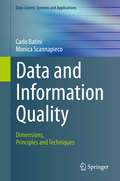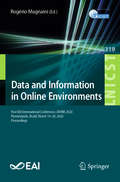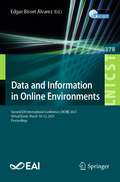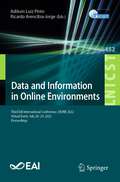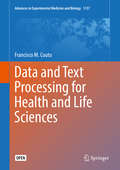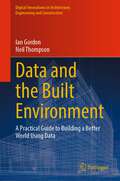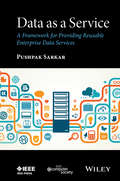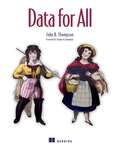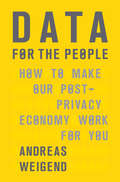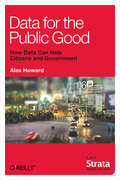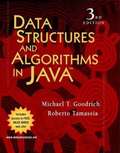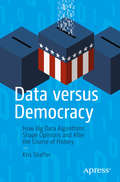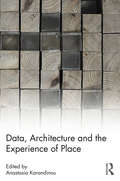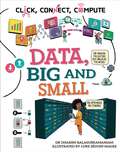- Table View
- List View
Data and Applications Security and Privacy XXXIV: 34th Annual IFIP WG 11.3 Conference, DBSec 2020, Regensburg, Germany, June 25–26, 2020, Proceedings (Lecture Notes in Computer Science #12122)
by Anoop Singhal Jaideep VaidyaThis book constitutes the refereed proceedings of the 34th Annual IFIP WG 11.3 Conference on Data and Applications Security and Privacy, DBSec 2020, held in Regensburg, Germany, in June 2020.* The 14 full papers and 8 short papers presented were carefully reviewed and selected from 39 submissions. The papers present high-quality original research from academia, industry, and government on theoretical and practical aspects of information security. They are organized in topical sections named network and cyber-physical systems security; information flow and access control; privacy-preserving computation; visualization and analytics for security; spatial systems and crowdsourcing security; and secure outsourcing and privacy. *The conference was held virtually due to the COVID-19 pandemic.
Data and Applications Security and Privacy XXXIX: 39th IFIP WG 11.3 Annual Conference on Data and Applications Security and Privacy, DBSec 2025, Gjøvik, Norway, June 23-24, 2025, Proceedings (Lecture Notes in Computer Science #15722)
by Sokratis Katsikas Basit ShafiqThis book constitutes the refereed proceedings of the 39th IFIP WG 11.3 Annual Conference on Data and Applications Security and Privacy XXXIX, DBSec 2025, held in Gjøvik, Norway, during June 23-24, 2025. The 19 full papers and 5 short papers included in this book were carefully reviewed and selected from 59 submissions. They were organized in topical sections as follows: AI applications in security and privacy; User and data privacy; Database and storage security; Differential privacy; Attackers and attack detection; Access control & Internal Controls and Audit process; and Cryptography for security and privacy.
Data and Applications Security and Privacy XXXV: 35th Annual IFIP WG 11.3 Conference, DBSec 2021, Calgary, Canada, July 19–20, 2021, Proceedings (Lecture Notes in Computer Science #12840)
by Ken Barker Kambiz GhazinourThis book constitutes the refereed proceedings of the 35th Annual IFIP WG 11.3 Conference on Data and Applications Security and Privacy, DBSec 2021, held in Calgary, Canada, in July 2021.*The 15 full papers and 8 short papers presented were carefully reviewed and selected from 45 submissions. The papers present high-quality original research from academia, industry, and government on theoretical and practical aspects of information security. They are organized in topical sections named differential privacy, cryptology, machine learning, access control and others.*The conference was held virtually due to the COVID-19 pandemic.
Data and Applications Security and Privacy XXXVI: 36th Annual IFIP WG 11.3 Conference, DBSec 2022, Newark, NJ, USA, July 18–20, 2022, Proceedings (Lecture Notes in Computer Science #13383)
by Shamik Sural Haibing LuThis book constitutes the refereed proceedings of the 36th Annual IFIP WG 11.3 Conference on Data and Applications Security and Privacy, DBSec 2022, held in Newark, NJ, USA, in July 2022.The 12 full papers and 6 short papers presented were carefully reviewed and selected from 33 submissions. The conference covers research in data and applications security and privacy.
Data and Applications Security and Privacy XXXVII: 37th Annual IFIP WG 11.3 Conference, DBSec 2023, Sophia-Antipolis, France, July 19–21, 2023, Proceedings (Lecture Notes in Computer Science #13942)
by Vijayalakshmi Atluri Anna Lisa FerraraThis volume LNCS 13942 constitutes the refereed proceedings of the 37th Annual IFIP WG 11.3 Conference, DBSec 2023, in Sophia-Antipolis, France, July 19–21, 2023. The 19 full papers presented together with 5 short papers were carefully reviewed and selected from 56 submissions. The conference focuses on secure data sharing; access control and vulnerability assessment; machine learning; and mobile applications.
Data and Applications Security and Privacy XXXVIII: 38th Annual IFIP WG 11.3 Conference, DBSec 2024, San Jose, CA, USA, July 15–17, 2024, Proceedings (Lecture Notes in Computer Science #14901)
by Ram Krishnan Anna Lisa FerraraThis book constitutes the proceedings from the 38th Annual IFIP 11.3 Conference on Data and Applications Security and Privacy XXXVIII, DBSec 2024, held in San Jose, CA, USA, during July 15–17, 2024. The 14 full papers and 6 short papers presented were carefully reviewed and selected from 39 submissions. The papers are organized in the following topical sections: access control; crypto application; privacy; attack; ml attack, vulnerability; security user studies; and differential privacy.
Data and Communication Networks: Proceedings Of Gucon 2018 (Advances in Intelligent Systems and Computing #847)
by Lakhmi C. Jain Valentina E. Balas Prashant JohriThe book constitutes selected high quality papers presented in International Conference on Computing, Power and Communication Technologies 2018 (GUCON 2018) organised by Galgotias University, India, in September 2018. It discusses issues in electrical, computer and electronics engineering and technologies. The selected papers are organised into three sections - cloud computing and computer networks; data mining and big data analysis; and bioinformatics and machine learning. In-depth discussions on various issues under these topics provides an interesting compilation for researchers, engineers, and students.
Data and Computer Communications: Networking and Internetworking
by Gurdeep S. Hura Mukesh SinghalThe protocols and standards for networking are numerous and complex. Multivendor internetworking, crucial to present day users, requires a grasp of these protocols and standards. Data and Computer Communications: Networking and Internetworking, a comprehensive text/reference, brings clarity to all of the complex issues involved in networking activi
Data and Energy Integrated Communication Networks: A Brief Introduction (SpringerBriefs in Computer Science)
by Kun Yang Jie HuThe book discusses data and energy integrated communication networking technologies, including the latest research contributions in this promising area. It firstly provides an overview of data and energy integrated communication networks (DEINs) and introduces the key techniques for enabling integrated wireless energy transfer (WET) and wireless information transfer (WIT) in the radio frequency (RF) band. It then describes the ubiquitous architecture of DEINs and demonstrates the typical DEIN system and investigates the core issues in both the physical layer and the medium-access-control (MAC) layer in order to coordinate both the WIT and WET in the same RF band. Lastly, the book addresses a number of emerging research topics in the field of DEINs. It promotes joint efforts from both academia and industry to push DEIN a step closer to practical implementation. It is also a valuable resource for students interested in studying cutting-edge techniques in this field.
Data and Goliath: The Hidden Battles to Collect Your Data and Control Your World
by Bruce SchneierYou are under surveillance right now. Your cell phone provider tracks your location and knows who's with you. Your online and in-store purchasing patterns are recorded, and reveal if you're unemployed, sick, or pregnant. Your e-mails and texts expose your intimate and casual friends. Google knows what you're thinking because it saves your private searches. Facebook can determine your sexual orientation without you ever mentioning it. The powers that surveil us do more than simply store this information. Corporations use surveillance to manipulate not only the news articles and advertisements we each see, but also the prices we're offered. Governments use surveillance to discriminate, censor, chill free speech, and put people in danger worldwide. And both sides share this information with each other or, even worse, lose it to cybercriminals in huge data breaches. Much of this is voluntary: we cooperate with corporate surveillance because it promises us convenience, and we submit to government surveillance because it promises us protection. The result is a mass surveillance society of our own making. But have we given up more than we've gained? In Data and Goliath, security expert Bruce Schneier offers another path, one that values both security and privacy. He shows us exactly what we can do to reform our government surveillance programs and shake up surveillance-based business models, while also providing tips for you to protect your privacy every day. You'll never look at your phone, your computer, your credit cards, or even your car in the same way again.
Data and Goliath: The Hidden Battles to Collect Your Data and Control Your World
by Bruce SchneierYou are under surveillance right now.<P><P> Your cell phone provider tracks your location and knows who’s with you. Your online and in-store purchasing patterns are recorded, and reveal if you're unemployed, sick, or pregnant. Your e-mails and texts expose your intimate and casual friends. Google knows what you’re thinking because it saves your private searches. Facebook can determine your sexual orientation without you ever mentioning it.<P> The powers that surveil us do more than simply store this information. Corporations use surveillance to manipulate not only the news articles and advertisements we each see, but also the prices we’re offered. Governments use surveillance to discriminate, censor, chill free speech, and put people in danger worldwide. And both sides share this information with each other or, even worse, lose it to cybercriminals in huge data breaches.<P> Much of this is voluntary: we cooperate with corporate surveillance because it promises us convenience, and we submit to government surveillance because it promises us protection. The result is a mass surveillance society of our own making. But have we given up more than we’ve gained? In Data and Goliath, security expert Bruce Schneier offers another path, one that values both security and privacy. He shows us exactly what we can do to reform our government surveillance programs and shake up surveillance-based business models, while also providing tips for you to protect your privacy every day. You'll never look at your phone, your computer, your credit cards, or even your car in the same way again.
Data and Information Quality: Dimensions, Principles and Techniques (Data-Centric Systems and Applications #0)
by Carlo Batini Monica ScannapiecoThis book provides a systematic and comparative description of the vast number of research issues related to the quality of data and information. It does so by delivering a sound, integrated and comprehensive overview of the state of the art and future development of data and information quality in databases and information systems. To this end, it presents an extensive description of the techniques that constitute the core of data and information quality research, including record linkage (also called object identification), data integration, error localization and correction, and examines the related techniques in a comprehensive and original methodological framework. Quality dimension definitions and adopted models are also analyzed in detail, and differences between the proposed solutions are highlighted and discussed. Furthermore, while systematically describing data and information quality as an autonomous research area, paradigms and influences deriving from other areas, such as probability theory, statistical data analysis, data mining, knowledge representation, and machine learning are also included. Last not least, the book also highlights very practical solutions, such as methodologies, benchmarks for the most effective techniques, case studies, and examples. The book has been written primarily for researchers in the fields of databases and information management or in natural sciences who are interested in investigating properties of data and information that have an impact on the quality of experiments, processes and on real life. The material presented is also sufficiently self-contained for masters or PhD-level courses, and it covers all the fundamentals and topics without the need for other textbooks. Data and information system administrators and practitioners, who deal with systems exposed to data-quality issues and as a result need a systematization of the field and practical methods in the area, will also benefit from the combination of concrete practical approaches with sound theoretical formalisms.
Data and Information in Online Environments: First EAI International Conference, DIONE 2020, Florianópolis, Brazil, March 19-20, 2020, Proceedings (Lecture Notes of the Institute for Computer Sciences, Social Informatics and Telecommunications Engineering #319)
by Rogério MugnainiThis book constitutes the refereed post-conference proceedings of the First International Conference on Data and Information in Online Environments, DIONE 2020, which took place in Florianópolis, Brazil, in March 2020. DIONE 2020 handles the growing interaction between the information sciences, communication sciences and computer sciences. The 18 revised full papers were carefully reviewed and selected from 37 submissions and focus on the production, dissemination and evaluation of contents in online environments. The goal is to improve cooperation between data science, natural language processing, data engineering, big data, research evaluation, network science, sociology of science and communication communities.
Data and Information in Online Environments: Second EAI International Conference, DIONE 2021, Virtual Event, March 10–12, 2021, Proceedings (Lecture Notes of the Institute for Computer Sciences, Social Informatics and Telecommunications Engineering #378)
by Edgar Bisset ÁlvarezThis book constitutes the refereed post-conference proceedings of the Second International Conference on Data Information in Online Environments, DIONE 2021, which took place in March 2021. Due to COVID-19 pandemic the conference was held virtually. DIONE 2021 presents theoretical proposals and practical solutions in the treatment, processing and study of data and information produced in online environments, the latest trends in the analysis of network information, media metrics social, data processing technologies and open science. The 40 revised full papers were carefully reviewed and selected from 86 submissions. The papers are grouped in thematical sessions on evaluation of science in social networking environment; scholarly publishing and online communication; and education in online environments.
Data and Information in Online Environments: Third EAI International Conference, DIONE 2022, Virtual Event, July 28-29, 2022, Proceedings (Lecture Notes of the Institute for Computer Sciences, Social Informatics and Telecommunications Engineering #452)
by Adilson Luiz Pinto Ricardo Arencibia-JorgeThis book constitutes the refereed post-conference proceedings of the Third EAI International Conference on Data and Information in Online Environments, DIONE 2022, held as virtual event, in July 28-29, 2022. Due to COVID-19 pandemic the conference was held virtually.DIONE 2022 aims to bring together academicians and practitioners willing to discuss topics around the intersection of Computer Science, Information Science, and Communication Science. The attractiveness of the scope and topics has brought relevant research results. This proceeding consists of chapters covering deep learning, data management, software design, social networks, natural language processing, and data processing in various contexts like scholarly publishing, health and medicine, higher education, innovation and research, energy and transportation, and organizations.The 18 full papers and 2 short papers were carefully reviewed and selected from 56 submissions. The papers are grouped in thematic sessions as follows: Informational challenges for the study of Science, Technology and Society relationships; and Advances in Artificial Intelligence for data processing and analysis in online social environments.
Data and Text Processing for Health and Life Sciences (Advances in Experimental Medicine and Biology #1137)
by Francisco M. CoutoThis open access book is a step-by-step introduction on how shell scripting can help solve many of the data processing tasks that Health and Life specialists face everyday with minimal software dependencies. The examples presented in the book show how simple command line tools can be used and combined to retrieve data and text from web resources, to filter and mine literature, and to explore the semantics encoded in biomedical ontologies. To store data this book relies on open standard text file formats, such as TSV, CSV, XML, and OWL, that can be open by any text editor or spreadsheet application. The first two chapters, Introduction and Resources, provide a brief introduction to the shell scripting and describe popular data resources in Health and Life Sciences. The third chapter, Data Retrieval, starts by introducing a common data processing task that involves multiple data resources. Then, this chapter explains how to automate each step of that task by introducing the required commands line tools one by one. The fourth chapter, Text Processing, shows how to filter and analyze text by using simple string matching techniques and regular expressions. The last chapter, Semantic Processing, shows how XPath queries and shell scripting is able to process complex data, such as the graphs used to specify ontologies. Besides being almost immutable for more than four decades and being available in most of our personal computers, shell scripting is relatively easy to learn by Health and Life specialists as a sequence of independent commands. Comprehending them is like conducting a new laboratory protocol by testing and understanding its procedural steps and variables, and combining their intermediate results. Thus, this book is particularly relevant to Health and Life specialists or students that want to easily learn how to process data and text, and which in return may facilitate and inspire them to acquire deeper bioinformatics skills in the future.
Data and the Built Environment: A Practical Guide to Building a Better World Using Data (Digital Innovations in Architecture, Engineering and Construction)
by Neil Thompson Ian GordonThis book takes a data-first approach to framing the built environment sector’s unique challenges and how industry can address them through better use of data. It describes how the sector has failed to derive value from data, and the common causes underlying this failure. It then provides practical guidance on how to use data to construct and operate built environment assets in a manner that better meets society’s needs. The book examines how industry norms, organizational culture, and our personal behaviours contribute to the successful use of data. It sets out a philosophy and vision for the use of data in the built environment, and how this in turn might help the sector realise better outcomes in terms of cost, schedule, quality, and sustainability. Data is a valuable asset, one that the built environment sector must generate, protect, manage, and exploit. The book works as a holistic primer to data and the built environment, written both for those who are new to data or the built environment, and including deep-dive material that will provide insight to experienced professionals.
Data as a Service: A Framework for Providing Reusable Enterprise Data Services
by Pushpak SarkarData as a Service shows how organizations can leverage "data as a service" by providing real-life case studies on the various and innovative architectures and related patterns Comprehensive approach to introducing data as a service in any organization A re-usable and flexible SOA based architecture framework Roadmap to introduce 'big data as a service' for potential clients Presents a thorough description of each component in the DaaS reference architecture so readers can implement solutions
Data for All
by John K. ThompsonDo you know what happens to your personal data when you are browsing, buying, or using apps? Discover how your data is harvested and exploited, and what you can do to access, delete, and monetize it.Data for All empowers everyone—from tech experts to the general public—to control how third parties use personal data. Read this eye-opening book to learn: The types of data you generate with every action, every day Where your data is stored, who controls it, and how much money they make from it How you can manage access and monetization of your own data Restricting data access to only companies and organizations you want to support The history of how we think about data, and why that is changing The new data ecosystem being built right now for your benefit The data you generate every day is the lifeblood of many large companies—and they make billions of dollars using it. In Data for All, bestselling author John K. Thompson outlines how this one-sided data economy is about to undergo a dramatic change. Thompson pulls back the curtain to reveal the true nature of data ownership, and how you can turn your data from a revenue stream for companies into a financial asset for your benefit. Foreword by Thomas H. Davenport. About the Technology Do you know what happens to your personal data when you&’re browsing and buying? New global laws are turning the tide on companies who make billions from your clicks, searches, and likes. This eye-opening book provides an inspiring vision of how you can take back control of the data you generate every day. About the Book Data for All gives you a step-by-step plan to transform your relationship with data and start earning a &“data dividend&”—hundreds or thousands of dollars paid out simply for your online activities. You&’ll learn how to oversee who accesses your data, how much different types of data are worth, and how to keep private details private. What&’s Inside The types of data you generate with every action, every day How you can manage access and monetization of your own data The history of how we think about data, and why that is changing The new data ecosystem being built right now for your benefit About the Reader For anyone who is curious or concerned about how their data is used. No technical knowledge required. About the Author John K. Thompson is an international technology executive with over 37 years of experience in the fields of data, advanced analytics, and artificial intelligence. Table of Contents 1 A history of data 2 How data works today 3 You and your data 4 Trust 5 Privacy 6 Moving from Open Data to Our Data 7 Derived data, synthetic data, and analytics 8 Looking forward: What&’s next for our data?
Data for the People: How to Make Our Post-Privacy Economy Work for You
by Andreas WeigendA long-time chief data scientist at Amazon shows how open data can make everyone, not just corporations, richerEvery time we Google something, Facebook someone, Uber somewhere, or even just turn on a light, we create data that businesses collect and use to make decisions about us. In many ways this has improved our lives, yet, we as individuals do not benefit from this wealth of data as much as we could. Moreover, whether it is a bank evaluating our credit worthiness, an insurance company determining our risk level, or a potential employer deciding whether we get a job, it is likely that this data will be used against us rather than for us.In Data for the People, Andreas Weigend draws on his years as a consultant for commerce, education, healthcare, travel and finance companies to outline how Big Data can work better for all of us. As of today, how much we benefit from Big Data depends on how closely the interests of big companies align with our own. Too often, outdated standards of control and privacy force us into unfair contracts with data companies, but it doesn't have to be this way. Weigend makes a powerful argument that we need to take control of how our data is used to actually make it work for us. Only then can we the people get back more from Big Data than we give it.Big Data is here to stay. Now is the time to find out how we can be empowered by it.
Data for the Public Good: How Data Can Help Citizens and Government
by Alex HowardAs we move into an era of unprecedented volumes of data and computing power, the benefits aren't for business alone. Data can help citizens access government, hold it accountable and build new services to help themselves. Simply making data available is not sufficient. The use of data for the public good is being driven by a distributed community of media, nonprofits, academics and civic advocates.This report from O'Reilly Radar highlights the principles of data in the public good, and surveys areas where data is already being used to great effect, covering: Consumer financeTransit dataGovernment transparencyData journalismAid and developmentCrisis and emergency responseHealthcare
Data structures and Algorithms in Java: 3rd edition
by Micheal T. Goodrich Roberto TamassiaThis edition is designed to provide an introduction to data structures and algorithms, including their design, analysis, and implementation. <P><P><i>Advisory: Bookshare has learned that this book offers only partial accessibility. We have kept it in the collection because it is useful for some of our members. Benetech is actively working on projects to improve accessibility issues such as these.</i>
Data versus Democracy: How Big Data Algorithms Shape Opinions and Alter the Course of History
by Kris ShafferHuman attention is in the highest demand it has ever been. The drastic increase in available information has compelled individuals to find a way to sift through the media that is literally at their fingertips. Content recommendation systems have emerged as the technological solution to this social and informational problem, but they’ve also created a bigger crisis in confirming our biases by showing us only, and exactly, what it predicts we want to see. Data versus Democracy investigates and explores how, in the era of social media, human cognition, algorithmic recommendation systems, and human psychology are all working together to reinforce (and exaggerate) human bias. The dangerous confluence of these factors is driving media narratives, influencing opinions, and possibly changing election results. In this book, algorithmic recommendations, clickbait, familiarity bias, propaganda, and other pivotal concepts are analyzed and then expanded upon via fascinating and timely case studies: the 2016 US presidential election, Ferguson, GamerGate, international political movements, and more events that come to affect every one of us. What are the implications of how we engage with information in the digital age? Data versus Democracy explores this topic and an abundance of related crucial questions. We live in a culture vastly different from any that has come before. In a society where engagement is currency, we are the product. Understanding the value of our attention, how organizations operate based on this concept, and how engagement can be used against our best interests is essential in responsibly equipping ourselves against the perils of disinformation.Who This Book Is ForIndividuals who are curious about how social media algorithms work and how they can be manipulated to influence culture. Social media managers, data scientists, data administrators, and educators will find this book particularly relevant to their work.
Data, Architecture and the Experience of Place
by Anastasia KarandinouThe notion of data is increasingly encountered in spatial, creative and cultural studies. Big data and artificial intelligence are significantly influencing a number of disciplines. Processes, methods and vocabularies from sciences, architecture, arts are borrowed, discussed and tweaked, and new cross-disciplinary fields emerge. More and more, artists and designers are drawing on hard data to interpret the world and to create meaningful, sensuous environments. Architects are using neurophysiological data to improve their understanding of people’s experiences in built spaces. Different disciplines collaborate with scientists to visualise data in different and creative ways, revealing new connections, interpretations and readings. This often demonstrates a genuine desire to comprehend human behaviour and experience and to – possibly – inform design processes accordingly. At the same time, this opens up questions as to why this desire and curiosity is emerging now, how it relates to recent technological advances and how it converses with the cultural, philosophical and methodological context of the disciplines with which it engages. Questions are also raised as to how the use of data and data-informed methods may serve, support, promote and/or challenge political agendas. Data, Architecture and the Experience of Place provides an overview of new approaches on this significant subject and is ideal for students and researchers in digital architecture, architectural theory, design, digital media, sensory studies and related fields.
Data, Big and Small (Click, Connect, Compute #3)
by Dharini BalasubramaniamData science fundamentals, using clear, expert explanations and comic illustrations to spark interest and enthusiasm in the next generation of computer scientists!Data, Big and Small delves into the details behind computer science data and information, which help people and organisations to make decisions. Learn how and why data are created, stored and shared. Find out how we make sense of information through graphs, maps and pictures, and understand how machines learn from the data that we feed them. The end of the book fast-forwards to the future of computer science, data and robotics, and considers what it might mean to live in a 'smarter' world.Contents: What are data? / Data, information and knowledge / Data are vital / Where do data come from? / Getting the format right / Storing all those data / The value is in the processing / Picture it! / Big data / Getting the most out of data / Keeping data secure / A trip into the future of data ... / Pioneer portraits / Further information / Glossary / Quiz yourself! / IndexThe Click, Connect, Compute series untangles the computer science web and teaches children about the essentials of computer software, hardware and digital literacy as well as discussing the ethics surrounding this evolving field. Featuring fun, friendly comic strip illustrations, pioneer bios and a quiz, this is a perfect read for children aged 8+.Books in the series: Computer Science Essentials / Data, Big and Small / Smart Machines / The Languages of ProgrammingWritten in a clear, thoughtful way by computer science expert, Dr. Dharini Balasubramaniam, a strong advocate for ethics and education in her field.
